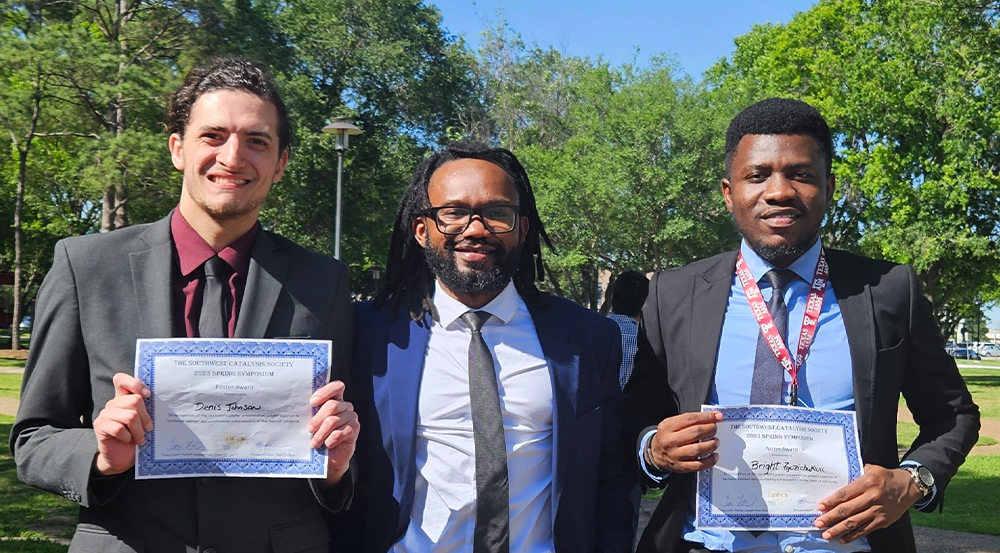
Denis Johnson and Bright Ngozichukwu, graduate students in the Artie McFerrin Department of Chemical Engineering at Texas A&M University, both received Best Poster presentation awards at the Southwest Catalysis Society Symposium with the assistance of their advising professor, Dr. Abdoulaye Djire.
Of the 39 research presentations and six universities attending the symposium, Johnson and Ngozichukwu were chosen as two of the top five best poster presenters. Their posters and presentations highlighted their research, which was critiqued by a series of judges.
Johnson’s research is in electrochemistry focused on converting nitrogen to ammonia for fertilizer usage. The research centers on combining air with water and converting that into ammonia, which is then used as fertilizer for crops.
Electrochemical nitrogen reduction reaction (NRR) converts atmospheric nitrogen to ammonia at ambient temperature and pressure, and the research group works to understand how stable these produced materials are. The goal is paving the way for the development of carbon-neutral fertilizer by expanding these findings to other materials and systems. Ultimately, these findings will help design optimal electrolytic conditions for the production of ammonia through NRR.
“My research is all on ammonia production and trying to shift it toward a greener system,” Johnson said. “There has been a lot of industry attention toward scalability and meeting performance metrics that would allow for it to be industrialized. We started addressing some of these metrics using our research.”
Ngozichukwu’s research is primarily focused on the rational design and optimization of MXene materials as catalysts for the conversion of carbon dioxide (CO2) into higher hydrocarbons. Efficient CO2 reduction reactions (CO2RR) can reduce anthropogenic greenhouse gas emissions, while also selectively producing high-value chemical compounds.
According to Ngozichukwu, the utilization of MXenes, which are tunable 2D transition metal carbides and/or nitrides, as catalysts serve as promising materials for the CO2RR process. In his research approach, he employs in-situ/operando spectroscopy to study the mechanistic pathways involved in the formation of CO2RR products. He has also devoted attention to investigating the stability of nitride-based MXenes, their suitability and potential applications.
Additionally, Ngozichukwu has a personal goal to apply his knowledge and expertise to contribute to the development and progress of his home country, Nigeria.
The electrochemical conversion process shows great promise in facilitating the development and implementation of a sustainable, carbon-neutral environment. With the high cost associated with non-renewable energy sources coupled with global climate change, this process of reducing carbon dioxide to higher hydrocarbons can have a profound and benign environmental impact.
“I think the novelty in his research combined with his ability to present these results to a broad audience creates significant value,” Djire said.
Overall, the competition taught Ngozichukwu and Johnson useful skills for their future careers.
“This is all part of the training they receive here at Texas A&M,” Djire said. “Because Denis wants to become faculty, this award will undoubtedly provide tremendous support to his career goal. The recognition he received through this achievement will serve as compelling evidence of his potential as an effective communicator.”